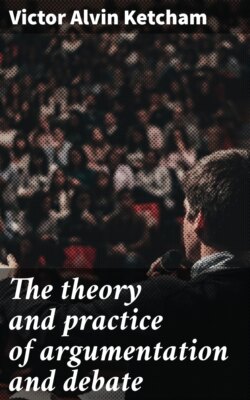Читать книгу The theory and practice of argumentation and debate - Victor Alvin Ketcham - Страница 51
На сайте Литреса книга снята с продажи.
2. A person quoted as authority must be unprejudiced, in full possession of the facts, and capable of giving expert testimony on the point at issue.
ОглавлениеIn the preceding section reliable sources of evidence have been indicated in a general way. It is, however, by no means possible in the treatment of all subjects to cite authorities so universally accepted. The opinions of persons who are not known to the general public may be given weight by means of their official position, their special work or investigation in any line, or by the favorable statements of recognized authorities regarding them or their work. As previously suggested, Who’s Who in America, is a storehouse of information regarding such people.
An opinion or even a statement of fact is not likely to be looked upon with favor unless it comes from an unprejudiced source. It is not so much the question of actual prejudice existing in the mind of the person quoted as it is the surrounding circumstances which would naturally tend to cause prejudice. For example, the statement of John D. Rockefeller, in regard to the beneficent effect of monopolies on trade and commerce, might be perfectly sincere, but since John D. Rockefeller has a financial interest in the maintaining of a monopoly, it would not be advisable to quote his statements in their favor. Such statements are not only easily refuted but they lack weight because they do not appear to come from an unprejudiced source. In like manner the President of the Brewers’ Association would not be accepted as authority on any matter connected with the prohibition of the liquor traffic. From the very circumstance of his position he is presumed to be prejudiced against such prohibition. The person cited as authority should have no financial interest in the subject on which he is quoted. He should be in a position to be unprejudiced.
The person quoted as authority must be in full possession of all the necessary facts. Very often this knowledge of facts may be presumed from the position which the authority occupies. The Secretary of the Navy is presumed to be in full possession of all the general facts concerning his department. The captain of a battleship would be presumed to know all the essential facts in regard to his ship. An engineer on the Panama Canal would be presumed to be in a position to know, and actually to know, facts connected with the duties of his position. The authority quoted must be in full possession of the facts which he is quoted to prove, or upon which his opinion is based.
Regarding the capability of an authority to give expert evidence much has been said. It is well to remember, however, that the opinion of fact or judgment must be in the field of the authority’s professional knowledge. The most eminent chemist in the United States would not be considered proper authority on an economic question; much less would the most eminent economist be considered good authority on some problem in chemistry. The President of the United States might be quoted as the highest authority on the political situation, while his opinion on some technical problem of engineering would fall before a counter opinion by an eminent engineer. In quoting an authority to establish an important point in evidence it is often advisable to show directly that he is unprejudiced, in full possession of the facts, and capable of giving expert testimony.
